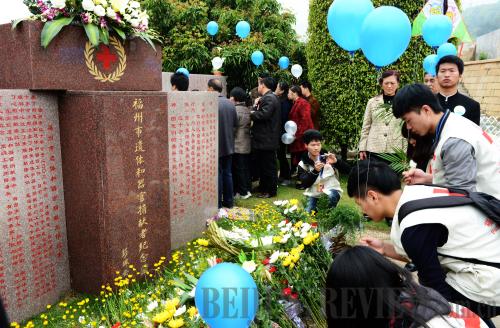|
 |
|
COMMEMORATION: Volunteers of the Red Cross Society of China present flowers to deceased organ donors at Sanshan Cemetery, Fuzhou of Fujian Province, on April 2, three days before China's Tomb Sweeping Day (ZHANG GUOJUN) |
According to Cao Yanfang, a coordinator in east China's Zhejiang Province, two thirds of candidates or their families refuse to donate organs. As a nurse in the intensive care unit (ICU) of a hospital, she had witnessed young people died of severe brain injuries while others died of organ failures. In 2010, when Zhejiang piloted its organ donation project, the 28-year-old Cao volunteered to become a coordinator to save lives through organ transplants.
She said although family members know that there is no hope to save a patient from death, organ donation means giving up further treatment.
Some families worry that organ donation agreements might give doctors incentives to withhold life-saving treatment.
Organ donation coordinators say they would not ask a patient's family to sign a donation agreement if there is any hope to save the patient's life, Cao said.
Only after making sure that a potential donor's situation is hopeless will the coordinator discuss organ donation with the family. "Communication is not easy, especially when the entire family is sad and desperate," Cao said.
Besides overseeing donations, coordinators have actually done a lot to help donors' families, said Cao.
"We regard donors' families as our kin, so we can identify their needs," said Cao. She said that during holidays, coordinators usually send greetings to donor families.
Current regulations in China stipulate that organ donations should be voluntary and uncompensated.
"When donor's families are in difficulty, they can be given some psychological and humanitarian assistance," said Liu Weixin, deputy director of China Human Organ Donation Management Center.
Gao wished she could do more to help donors and their families. She told Hong Kong-based Phoenix Satellite TV that at the end of 2012, a 33-year-old single mother with terminal cancer talked to her about her wish to donate organs.
The patient told Gao that her 7-year-old daughter, born out of wedlock, did not go to school. She begged Gao to help her daughter and find a good family to adopt her.
She passed away in early 2013. By then, the girl was still living with her ill grandmother and still isn't in school. Gao says she will continue to help the daughter anyway she can.
Volunteer coordinators
Coordinating donations, though difficult and certainly meaningful, remains pro bono.
Gao has never received compensation besides reimbursements for telephone and transportation costs in her eight years of coordinating for the RCSC. She is primarily supported by her younger sister.
But the job of organ donation coordinator might become a paid one this year, according to the China Human Organ Donation Management Center.
Existing volunteers who meet standards set by the Ministry of Health and China Human Organ Donation Management Center may qualify for professional positions in coordinating organ donations, said Gao Xinpu of the organ donation center.
Thereafter, most organ donation coordinators in China should have medical backgrounds, and they should be trained and evaluated by the RCSC, said Gao Xinpu, who believes the country should have one professional organ donation coordinator for every million people. For a nation with 1.3 billion population, that would mean recruiting and training 1,300 professional coordinators.
"Every year there are 154,000 potential donors in China's ICUs. As long as we do our work, we can have at least 40,000 donors and 110,000 organs every year," said Huang Jiefu, former Vice Minister of Health and one of the leading advocates for organ donation. Huang said that would lower the ratio of patients waiting for organs to those who can receive transplants to 3:1.
Email us at: wanghairong@bjreview.com | 